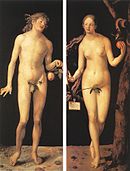Greek mythology
Apples appear in many religious traditions, often as a mystical or forbidden fruit. One of the problems identifying apples in religion, mythology and folktales is that the word "apple" was used as a generic term for all (foreign) fruit, other than berries but including nuts, as late as the 17th century.[7] For instance, in Greek mythology, the Greek hero Heracles, as a part of his Twelve Labours, was required to travel to the Garden of the Hesperides and pick the golden apples off the Tree of Life growing at its center.[12][13][14]
The Greek goddess of discord, Eris, became disgruntled after she was excluded from the wedding of Peleus and Thetis.[15] In retaliation, she tossed a golden apple inscribed Καλλιστή (Kalliste, sometimes transliterated Kallisti, 'For the most beautiful one'), into the wedding party. Three goddesses claimed the apple: Hera, Athena, and Aphrodite. Paris of Troy was appointed to select the recipient. After being bribed by both Hera and Athena, Aphrodite tempted him with the most beautiful woman in the world, Helen of Sparta. He awarded the apple to Aphrodite, thus indirectly causing the Trojan War.
Atalanta, also of Greek mythology, raced all her suitors in an attempt to avoid marriage. She outran all but Hippomenes (a.k.a. Melanion, a name possibly derived from melon the Greek word for both "apple" and fruit in general),[13] who defeated her by cunning, not speed. Hippomenes knew that he could not win in a fair race, so he used three golden apples (gifts of Aphrodite, the goddess of love) to distract Atalanta. It took all three apples and all of his speed, but Hippomenes was finally successful, winning the race and Atalanta's hand.[12]



No comments:
Post a Comment